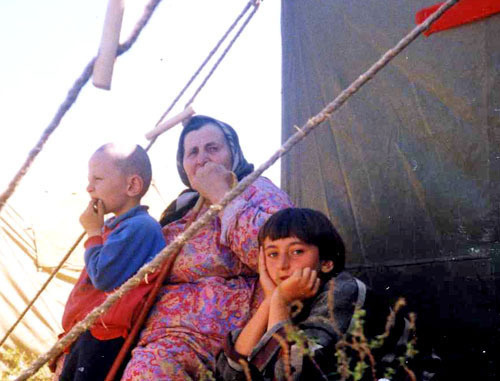
18 September 2012, 23:40
30 IDPs, living in Ingushetia, go on hunger strike
The refugees or internally displaced persons (IDPs) from Chechnya, residing in the territory of the "Promzhilbaza" (in the city of Karabulak), declare their readiness to start a hunger strike on September 20. In total, 30 persons intend to take part in the protest action.
Let us remind you that the basic demand of the protesters is to solve the problem of housing, and the protest action will be held under the slogan: "Ramzan Kadyrov bring us home!" Earlier, the IDPs appealed for help to the board of the association "Caucasian Forum".
Malika Djakhaeva, a resident of the temporary accommodation centre (TAC) "Promzhilbaza", stated that the authorities fail to solve the refugees' problems for more than 18 years.
"The refugees from the Chechen Republic joined together, and on September 20, they intend to start a hunger strike in connection with the fact that our problem remains unresolved for 18 years already. At present, elderly people, orphans and people with disabilities live here. And it is a big question whether they will survive till 2015, when Yunus-Bek Evkurov, the leader of the republic, promises to build multi-storey buildings for us," Malika Djakhaeva has stressed.
In total, 30 residents of the TAC "Promzhilbaza" declared their intention to take part in the hunger strike. According to Malika Djakhaeva, the authorities and human rights defenders in Ingushetia and Chechnya are aware of the protest action under preparation; however, they "do not express any concern over it."
"We live at the 'Promzhilbaza' in Karabulak since 1999. During those years, we appealed to different institutions: we sent letters to the Government of the Chechen Republic, and we wrote to President Medvedev and President Putin. No one draws any attention to our problem. The hunger strike is a desperate step, which aim is to draw the authorities' attention to our problem," Malika Djakhaeva has expressed her opinion.
Djambulat Ozdoev, Republic's Ombudsman, believes that the situation of IDPs is a long-standing, chronic problem of Ingushetia. The refugees live in very difficult conditions, since the houses, provided to them, were not designed for such a long stay in it: in 15-20 years, they have fallen into disrepair.
"In this regard, President Evkurov has raised the question to the federal authorities that deal with issues of the immigration policy: what should be done with the problem, and why it is not being solved. The federal programme was adopted, under which till 2015, the IDPs will be provided with housing," the official has emphasized.
Besides, at present, the IDPs will be able to benefit from the programme: the bodies of local self-administration, in which territory they reside, pay for rental housing in the amount of 5000 roubles a month. This was stated by the Ombudsman in the Republic of Ingushetia.
"We conduct the work, and the situation is improving. Meanwhile, there are people among the IDPs, who say: 'We will not move from here we want to live here, and our children go to school here.' However, there is the concept 'I want', and there is the concept 'the objective situation'," Djambulat Ozdoev has expressed his opinion.
According to the Ombudsman, the hunger strike could further deteriorate the difficult situation. "Their problems have been identified, they are known, and they are being solved. However, the regional authorities cannot solve them immediately. They are doing everything that depends on them," Djambulat Ozdoev stated.
As far as the extension of an IDP's status is concerned, then, in accordance with the explanation of the Supreme Court of the Russian Federation, where the Ingush authorities appealed to, it can be extended to a full housing arrangement. "An IDP, who once passed the court consideration and who had achieved renewal of his or her status, should now go to courts every year," the official stated.
The authorities of Karabulak try to help the IDPs. This was stated by Mukhmad Bariev, the head of the city administration.
"At present, the IDPs live at the 'Promzhilbaza' absolutely for free they do not pay for anything. The administration does not evict them, and it helps them in everything it can," said the head of the administration of Karabulak.
According to Mukhmad Bariev, the hunger strike has no sense, since the compensations are being paid; and the IDPs should only wait for a while.
"The state pays compensations to them. The consolidated list has been prepared, and the payments are being conducted in phases. However, they (the IDPs, note of the "Caucasian Knot") want everything today and now. I believe that the hunger strike has no sense. Moreover, it could destabilize the entire situation," Mukhmad Bariev continued.
Author: Elena Khrustaleva Source: CK correspondent




